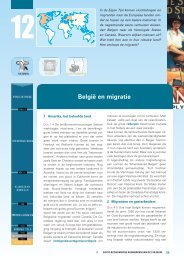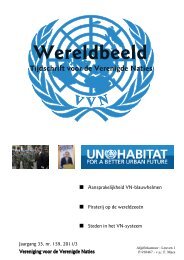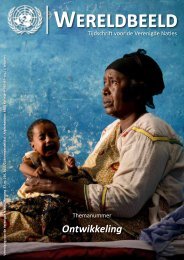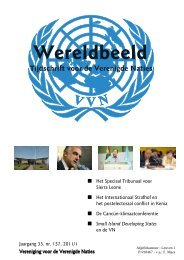Annex 5: United Nations Security Council Resolution 1874 (2009)
Annex 5: United Nations Security Council Resolution 1874 (2009)
Annex 5: United Nations Security Council Resolution 1874 (2009)
Create successful ePaper yourself
Turn your PDF publications into a flip-book with our unique Google optimized e-Paper software.
Kim Il-sung died in 1994 and his son Kim Jong-il, head of the armed forces, assumed control.<br />
Amid rumours of a power struggle however, he was not confirmed as General Secretary of<br />
the Communist Party until October 1997. A short period of rapprochement with South Korea<br />
and the <strong>United</strong> States followed, culminating in an unprecedented summit between Kim<br />
Jong-il and South Korean President Kim Dae-jung in 2000. Despite this, food shortages and<br />
economic hardships have continued, despite some hopes that the country would emulate<br />
China's modern-day free market reforms. In recent years, North Korea's series of ballistic<br />
missile tests and efforts to build nuclear weapons has fuelled regional tension (BBC, <strong>2009</strong>).<br />
A Brief Snapshot of the DPRK: Politics, Geography, Economy and Military<br />
Leadership and politics<br />
Kim Jong-il is North Korea's supreme ruler and so far, the<br />
only communist leader to ever have inherited power from<br />
his father. Kim Jong-il was born in Siberia, Russia during<br />
his father's period of exile from Korea in 1941. Since<br />
coming to power he has further developed and refined<br />
elements of his father's Juche doctrine of self-sufficiency.<br />
Details of the exact power structure within North Korea<br />
are obscure. Western political observers consider it to be an<br />
archetypal totalitarian state reminiscent of Stalin's Russia,<br />
with a state ideology which combines Juche with more<br />
conventional strands of marxist-communism. In line with<br />
many other communist leaders, Kim Il-sung fashioned a strong personality cult to<br />
consolidate his power and his son Kim Jong-il followed suit (BBC, <strong>2009</strong>).<br />
In early August 2008, Kim Jong-Il suffered a debilitating stroke after he failed to appear at an<br />
event celebrating the sixtieth anniversary of the founding of the state. Despite official<br />
protestations of his good health, Kim Jong-Il disappeared from sight for several months with<br />
many rumors circulating about his physical and mental impairment. However, with no<br />
outward signs that a leadership transition is under way, the prevailing expectation is that he<br />
is recuperating and the situation will eventually return to the status quo ante. It is possible,<br />
however, that Kim Jong-Il’s condition may actually be much worse than press reports<br />
suggest and that his capacity to govern ––if it hasn’t already been seriously compromised––<br />
may be short lived. There has long been speculation that he is a diabetic and therefore prone<br />
to kidney failure, heart complications, and at a higher risk of stroke (Stares & Wit, <strong>2009</strong>).<br />
According to Dean Yates, the following scenarios can be distinguished on how the internal<br />
situation may play out in North Korea over the coming months and years (Yates, <strong>2009</strong>):<br />
- Scenario 1: SMOOTH TRANSITION<br />
The longer Kim lives and remains in reasonable health, the greater the chance of a<br />
smooth transition of power to his youngest son, Kim Jong-un, today 26 years of age. If<br />
Jong-un has 15 or 20 years to cement his position, he may be able to continue the Kim<br />
dynasty. Kim junior is also believed to have the backing of Jang Song-thaek,<br />
effectively the country's number 2 leader. Kim Jong-il in April promoted Jang, his 63year-old<br />
brother-in-law, to the powerful National Defense Commission, which many<br />
analysts saw as an attempt to establish a mechanism for the transfer of power, with<br />
Jang as kingmaker. Under this scenario, financial market players would watch events<br />
in North Korea with interest but not trade dramatically either way. Global powers<br />
would seek to ascertain the intentions of the new leadership as it took shape. North<br />
Korean policy toward the outside world may not alter much.<br />
© <strong>2009</strong> – Dr. D. Criekemans – Negotiations in UNSC on the continuing security provocations by North Korea 10







